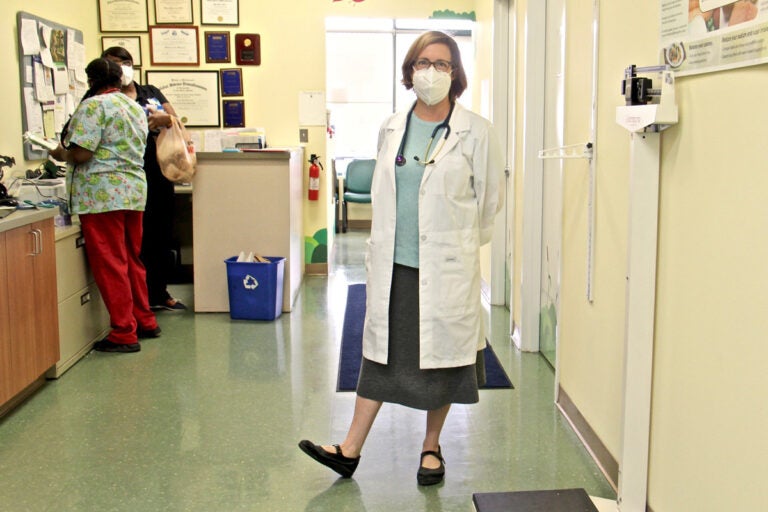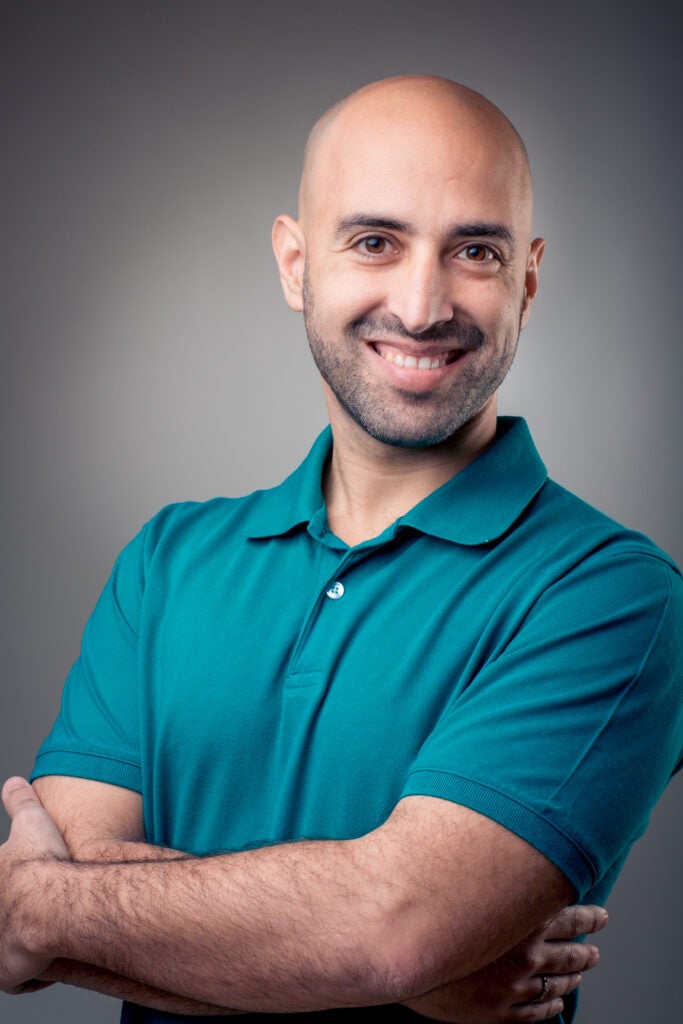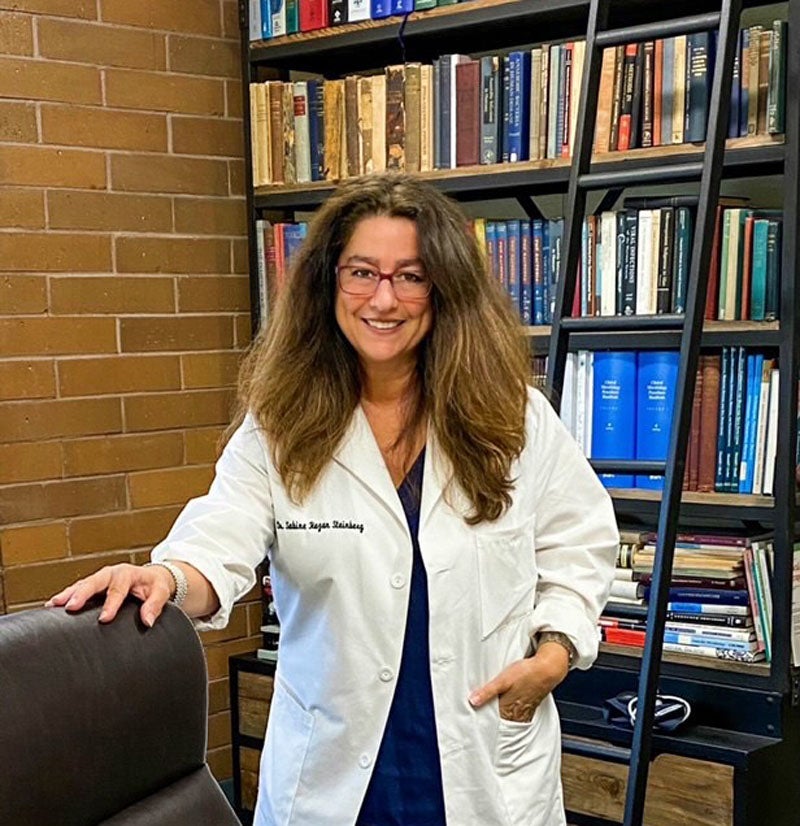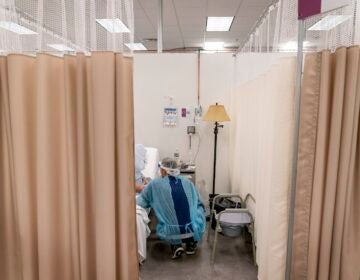Some doctors think they’ve found a cheap, generic drug which treats COVID-19. So why hasn’t anyone heard of it?
How faulty data, Big Pharma and the fallout from hydroxychloroquine has haunted the research world, as desperate doctors and researchers look for a COVID-19 treatment.
Listen 14:52
Dr. Alexis Lieberman. (Emma Lee/WHYY)
This story is from The Pulse, a weekly health and science podcast.
Subscribe on Apple Podcasts, Stitcher or wherever you get your podcasts.
Updated Sept. 29
For three nights in April, Heather Coutts listened through the door as her husband lay awake in bed, gasping for air. He told her later he’d strained to remember the details of his life insurance policy — had he signed all the documents? — in case he didn’t make it. Coutts cared for him from a distance, while minding their 11-year-old and 1-year-old.
After two weeks of belabored breathing, extreme fatigue and a trip to the emergency room, her husband started to feel better. But Coutts felt like she’d been hit by a truck. She had a sore throat and a fever.
Hoping to avoid the hell her husband had just endured, Coutts called her close friend Alexis Lieberman, a Philadelphia pediatrician, to ask if there was anything else she should be doing. Lieberman and Coutts are like family — they met years ago volunteering at a camp for kids with queer parents and have stayed friends ever since. So when Lieberman suggested that Coutts try ivermectin, a cheap, safe drug designed to treat parasites that had few and rare serious side effects, Coutts trusted her.
“We kind of thought, well, there’s no negatives to taking this,” said Coutts. “It’s not going to have any really bad side effects. If it could help, why not?”
Within 24 hours, her fever was gone. After two days, Coutts felt completely herself again.
The Case for a Cheap, Available Treatment
In the early days of the pandemic, Lieberman was convinced that the best way to temper the impact of the novel coronavirus would be to find an inexpensive, generic drug that would mitigate the virus’s symptoms and keep people out of the hospital. None of the big medical associations, like the American Association of Pediatrics or the American Medical Association, were recommending therapies yet, so Lieberman looked in the various Facebook groups full of doctors she belonged to.
“There were people just trying things,” she recalled. “Especially ICU doctors and hospitalists. That’s it, just trying things.”
Lieberman kept a running list of all the drugs her fellow physicians posted, researched each one, and eliminated those whose potential side effects were too risky. Among the remaining possibilities was ivermectin.
Developed in the 1980s by Merck and approved by the Food and Drug Administration in tablet form to treat worms and as a topical cream to treat head lice, ivermectin is off-patent, widely available and inexpensive, and has few known side effects when taken at appropriate doses. It was originally developed to treat parasites in animals, and is still used for heartworm. It’s been shown to be somewhat effective in treating other viruses, like dengue and yellow fever.
Lieberman’s interest was piqued in April, when she saw the results of a study published by a group of Australian researchers showing that ivermectin slowed the replication of the novel coronavirus in mammal cells. The scientists infected the cells with SARS-Cov-2 in a test tube, added ivermectin, and found that within 24 hours, the amount of viral RNA had been reduced by 93%. By 48 hours, essentially all viral material was eradicated.
The results, while promising, fell short of a miracle cure: The concentration of ivermectin used on the cells was way too high to be safe or even feasible in the human body. Still, at lower doses, the researchers indicated that ivermectin had the potential to inhibit the replication of the virus in the body.
The drug could also work differently in humans than in isolated cells because ivermectin modulates the way the body responds to inflammation and infection, according to Carlos Chaccour, an assistant professor of tropical medicine at Instituto de Salud Global de Barcelona. Chaccour has devoted more than a decade of his career to studying ivermectin. He said the in vitro study alone was not enough to start treating people en mass with ivermectin. Yet it showed enough promise to merit further research.

“This is a safe drug for a non-treatable disease, so test it, by all means,” he said. “And if it doesn’t work, then put it to bed. And if it works, then jackpot.”
‘You’re suggesting eye of newt’
Emboldened by the potential of the in vitro study and her success with Coutts, Lieberman started prescribing ivermectin to other patients, with anecdotal success. Still, she knew better than to extrapolate any conclusions from a few individual instances, and wondered whether there were any clinical studies she could draw data from.
She started posting about ivermectin in one of her doctors’ Facebook groups — one for physicians who are also moms. Expecting to be met with the same sense of experimentation she saw in earlier months, the response she got was jarring.
“When I try to talk to doctors about ivermectin, it feels like someone has poisoned them against it before I even say my first word,” Lieberman said. “The level of response is: You’re suggesting eye of newt. Why don’t we try some mugwort? Why don’t we try some fairy dust?”
Lieberman was surprised. The FDA has noted that in very rare instances, serious side effects have been reported including the sometimes-fatal Stevens-Johnson syndrome, seizures and liver toxicity. Ivermectin can interact poorly with blood thinners, causing complications. Still, the National Institute of Health classifies it as having a very high safety profile for its wide use in the eradication of parasitic worms.
It’s common for doctors to treat patients using off-label drugs with a safe track record, especially in the context of a public health emergency for a disease with no known treatment. In the World Health Organization’s COVID-19 guidance on the practice, known as compassionate use, it notes that “the decision to offer a patient an unproven or experimental treatment is between the doctor and the patient but must comply with national law.” Still, the NIH does not recommend ivermectin be used outside clinical trials.
As she watched the trajectory of the antimalarial hydroxychloroquine rise and subsequently fall in the public eye, it dawned on Lieberman that some of the hostility she faced must be because the medical community was traumatized by its unbridled use. President Donald Trump hailed the drug as a potential “game changer” during the peak of the pandemic without any scientific evidence to back that up, sparking a frenzy of self-medication. An Arizona couple ingested the chloroquine tablets for a fish tank, which killed one of them; a run on the drug left lupus patients at a loss for the daily treatment they depend on.
Lieberman said some people expressed fear the same thing would happen if another cheap, accessible drug were promoted before there was substantial evidence for its success.
Three thousand miles away, deep in the Peruvian rainforest, that was already happening.
Spiraling out of control
In Latin America, ivermectin is a common treatment for parasitic worms; it’s inexpensive and available over the counter. Its ubiquity there meant that the release of the in vitro study from Australia caused quite a stir among health officials, who were drawn to the potential promise of a drug in such wide circulation. Chaccour also attributed what he described as an over-reliance on the study to its somewhat misleading title, “The FDA-approved drug ivermectin inhibits the replication of SARS-CoV-2 in vitro”. Ivermectin is FDA-approved, but not for COVID-19.
In Peru, the need for such a treatment was mounting. Cases began to soar in April, with the number of official COVID-19 deaths there likely a dramatic undercount. By the beginning of May, COVID-19 was spreading among thousands of Indigenous residents of Peru’s Loreto region in the Amazon jungle. Many of the communities there lack road access, and flights were grounded due to travel restrictions, making supplies in already remote areas hard to obtain. Hospitals quickly ran out of bed space and oxygen. Official case counts were unreliable due to lack of testing, but local infectious disease experts estimated that 60% of people in Loreto’s most populous city, Iquitos, could have been infected. The positivity rate there is over 30%.
Meanwhile, it appeared new research to support ivermectin was emerging. Shortly after the Australian study came out, a Chicago-based company called Surgisphere released several papers based on data pulled from a massive pool of COVID-19 patients at 1,200 hospitals around the world. The data became known for demonstrating evidence against hydroxychloroquine, but researchers also drew from the data to explore the impact of ivermectin. Their “pre-prints” — non-peer-reviewed studies — showed the drug had significant promise: Patients who received ivermectin had a 65% reduction in the need for mechanical ventilation and an 83% reduction in overall death rate.
The combination of the Surgisphere study and the in vitro Australian research was enough for Peru’s health ministries to recommend ivermectin in their national COVID-19 treatment protocol. Bolivia did the same.
Just a few weeks after the preprints were released, it was revealed that the entire Surgisphere data set had likely been fabricated. The Lancet and the New England Journal of Medicine both retracted the studies they had published based on the data. The ivermectin pre-prints were also retracted.
Brief currency though it had, the evidence backing ivermectin was quickly adopted by elected officials.
“There is a ghost of this pre-print driving policy decisions all through Latin America,” Chaccour said.
In Loreto, the province’s leader had joined forces with a group of evangelical volunteers to offer free ivermectin injections to thousands of residents. Local reports noted there was a run on pharmacies, draining their supply of ivermectin. Some began using the veterinary formulation of the drug, instead of the one designed for humans. At the beginning of June, the country’s health minister proclaimed there was “no time to wait for scientific evidence,” and President Martín Vizcarra announced the country had acquired 500,000 doses of ivermectin for distribution.
Ultimately the Peruvian government issued a warning against using the veterinary formula, but Chaccour said it is now encouraging hospitals and pharmacies to formulate their own ivermectin, a process that is normally highly regulated.
It’s difficult to know if the treatment did, in fact, work, because of a lack of follow-up care or data tracking. Doctors reported that some who received the mass injections developed racing heartbeats and anxiety; others got infections at the injection site.
Overall, the rate of new cases in the region did begin to slow by early June. But with such widespread consumption, it’s difficult to isolate ivermectin as having a causal effect. Cases have risen again in Peru; it has the fifth highest COVID-19 case count of any country in the world, with its steepest increase in case counts during the month of August.
Beyond the potential for side effects and lack of oversight, Chaccour worries about a false sense of security that widespread use of an unproven drug could offer.
“How about moral risk — people feeling `protected’ because they got their shot?” he said. He also noted that because parasites modulate the body’s immune response, massive deworming of a population where the prevalence of parasites is naturally high could affect the way an entire population responds to COVID-19 or other viruses.
On June 22, the Pan-American Health Organization, a regional subset of the World Health Organization, issued a statement saying that ivermectin should not be used to treat COVID-19, and that it would not be included in its international Solidarity Trials, which included the antiviral drug remdesivir and hydroxychloroquine. The FDA also issued a warning not to self-medicate with ivermectin.
Subscribe to The Pulse
What it takes to get a trial off the ground
Back in Philadelphia, Alexis Lieberman was at her wits’ end. She recognized that unsanctioned, mass injections of Indigenous groups is “less than ideal,” but the way she saw it, a comprehensive study would put the issue to bed once and for all. She just could not understand why the FDA or a large research institution wouldn’t fund an ivermectin trial when it showed such promise.
“The truth is any country could complete a study on whether or not ivermectin helps COVID disease in the space of three weeks, and nobody’s done that,” Lieberman said. “It’s worth one big, fast, well-designed, well-funded study that I think the government should pay for.”
In the absence of a large study, Lieberman set out to conduct her own. She teamed up with a statistician, someone who runs clinical trials for a living and a handful of doctors around the globe who’d had their own anecdotal success with ivermectin. One of them, a pulmonary critical care specialist in Broward County, Florida, named Jean Jacques Rajter, had been treating patients in his ICU with ivermectin since he saw the Australian in vitro study.
Rajter published the results of an analysis of his patients’ charts, which found a 10% reduction in mortality rate among severely ill COVID-19 patients who had been given ivermectin. His paper is in the process of being peer-reviewed for official publication.
Another study, conducted at the University of Baghdad and listed on clinicaltrials.gov, found that patients who received ivermectin had shorter hospital stays than those who didn’t by an average of five days.
Both Rajter’s study and the Iraqi study were observational, in part because getting a gold-standard, randomized controlled trial approved by federal agencies and having the money to back it is no easy task. Rajter, Liebermann and their team proposed a study that would span several dozen emergency departments across the country. They scraped together the cash for an independent institutional review board to approve their research protocol, but were denied on the grounds that they had too many participating locations for there to be a reliable control. With the support of a large research institution or teaching hospital, they say, that problem could be solved. They estimate they could conduct a 300-person study like the one they proposed for a couple hundred thousand dollars.
“That would not be an expensive proposition for a regulatory agency, considering the amounts of resources that are being spent across the board,” Rajter said.
But, he said, because no one in his group has a prestigious university or pharmaceutical company to back them, it’s been a struggle to garner attention.
“Ivermectin is a generic drug, so no one is going to make a lot of money,” Rajter said. “There’s no windfall for any pharmaceutical company here.”
Trials for remdesivir, which is owned by pharmaceutical giant Gilead; hydroxychloroquine, which was touted by Trump; and the steroid dexamethasone, studied at Oxford University, all yielded results within months, helping to formulate the standards of care for COVID-19.
Merck, which originally developed ivermectin but whose patent on it expired, does not endorse its use for COVID-19 treatment. In a statement, a Merck representative said that “following detailed review of the evidence available for ivermectin we calculated that the dose required to attain an antiviral effect would significantly exceed the doses known to be safe and well tolerated,” referencing the in vitro study. “We therefore concluded that further research to evaluate the clinical potential of ivermectin for the treatment of SARS-CoV-2 was not warranted.”
Merck is in the process of developing its own new therapy for COVID-19, which it would presumably patent. It is also involved in vaccine trials.
A representative from Merck was not available for an interview with WHYY.
Knowing how to play the game
Getting a clinical trial going can be a smoother process if the doctor has a relationship with pharmaceutical companies and the FDA, as Sabine Hazan does. A Malibu-based gastroenterologist who runs a company that facilitates clinical trials for pharmaceuticals, Hazan’s research mostly focuses on the microbiome — essentially, the genetic makeup of the human gut. Before the pandemic, she was thrilled to dig deeper into her latest project: research on the impact of fecal transplants on autism.
But when the pandemic hit, all Hazan’s research stopped in its tracks. Patients were too scared to come to her clinic to participate in trials. Nobody seemed to care about the gut anymore. She figured the fastest route back to her research was to apply her expertise toward finding a cheap, effective treatment for COVID-19.

“I honestly think there’s something wrong with me because I play with poop, I play with a dangerous virus, and I’m in bed with Big Pharma,” Hazan said. “And let’s not forget the FDA!”
Hazan decided to leverage her experience conducting clinical trials to run one for ivermectin, which she knew about because her sister had studied it as a treatment for head lice. She teamed up with Australian scientist Thomas Borody, whose treatment for Crohn’s disease appears to have cured the illness in many patients.
Because ivermectin is generic, Hazan knew there was no money to be made on this, but she wasn’t concerned about that for herself. Recently, she turned 50 and told her husband that for her midlife crisis, instead of buying a Lamborghini or a condo in Italy, she’d be investing in the latest $250,000 stool analysis technology. Besides, she figured the sooner the medical community could find a treatment for COVID-19, the sooner she could get back to her normal life, and her own research.
Hazan is paying for the clinical trial, which aims to recruit 300 patients, out of her own savings. Costs range from the medical equipment each patient will receive to monitor their improvement, such as Holter heart monitors and pulse oximeters, to the cost of hiring aides to draw blood regularly at patients’ homes. She said she is hopeful for investment from the pharmaceutical industry, but so far no companies have stepped up. She has worked with Merck in the past on drug trials, and approached the company about investing in ivermectin, but it wasn’t interested.
“Nobody wants to invest in trials in medications that are cheap because they’re not making any money,” Hazan said. “But these are billion-dollar companies. It’s time for them to give back. It’s more important to be a hero than it is to be rich.”
She is about to start recruiting participants for the double-blind, randomized control trial, which Hazan anticipates will be a challenge.
“Trying to convince people to go on a trial where they may be on a sugar pill is a nightmare,” she said. “But it needs to be done.”
There are now 32 studies for ivermectin listed on clinicaltrials.gov, including Hazan’s, and Chaccour is running his own as well. Aside from the Iraqi study, all these studies are still in the recruiting stages.
Alexis Lieberman is still offering ivermectin to her patients in Philadelphia. In the absence of more evidence to back her observations, she includes the caveat that it’s not FDA-approved for COVID-19 but there are a couple of studies that show promise. She estimated she’s given it to a dozen patients, with strong results each time.
Lieberman does her best to resist being drawn toward conspiracy theories that there is a concerted effort to stamp the drug out. Instead, she’s largely resigned herself to the reality that the financial forces driving the pharmaceutical research industry are enough to keep ivermectin low on their priority list.
“You don’t need a cabal of people in a back room saying, ‘Let’s make sure this one doesn’t go because we’re gonna make more money off the other one,’” she said. “I just think you have a million small actors, who act in their small fields, and are completely ruled by what will make money.”
But for her, it’s high on the priority list. People are still dying, and she’s not willing to wait.
—
This article was updated with additional details about the rare side effects associated with use of ivermectin.
WHYY is your source for fact-based, in-depth journalism and information. As a nonprofit organization, we rely on financial support from readers like you. Please give today.




![CoronavirusPandemic_1024x512[1]](https://whyy.org/wp-content/uploads/2020/03/CoronavirusPandemic_1024x5121-300x150.jpg)



